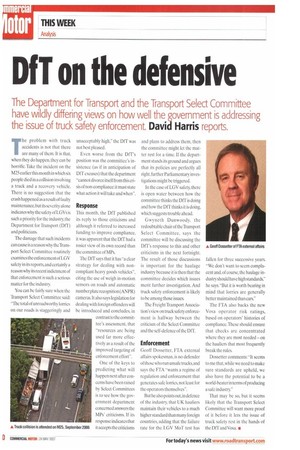DfT on the defensive
Page 20

If you've noticed an error in this article please click here to report it so we can fix it.
The Department for Transport and the Transport Select Committee have wildly differing views on how well the government is addressing the issue of truck safety enforcement. David Harris reports.
The problem with truck accidents is not that there are many of them. It is that, when they do happen, they can be horrific. Take the incident on the M25 earlier this month in which six people died in a collision involving a truck and a recovery vehicle. There is no suggestion that the crash happened as a result of faulty maintenance,but its severity alone indicates why the safety of LGVs is such a priority for the industry, the Department for Transport (DfT) and politicians.
The damage that such incidents can cause is a reason why the Transport Select Committee routinely examines the enforcement of LGV safety in its reports, and certainly a reason why its recent indictment of that enforcement is such a serious matter for the industry.
You can be fairly sure when the Transport Select Committee said: "The total of unroadworthy lorries on our roads is staggeringly and unacceptably high,the DIT was not best pleased.
Even worse from the DfT's position was the committee's insistence (as if in anticipation of DIF excuses) that the department "cannot divorce itself from this crisis of non-compliance: it must state what action it will take and when".
Response
'Ibis month, the DfT published its reply to those criticisms and although it referred to increased funding to improve compliance, it was apparent that the Da' had a rosier view of its own record than the committee of MPs.
The DfT says that it has "a clear strategy for dealing with noncompliant heavy goods vehicles", citing the use of weigh in-motion sensors on roads and automatic number plate recognition (ANPR) cameras. It also says legislation for dealing with foreign offenders will be introduced and concludes, in contrast to the committee's assessment, that -resources are being used far more effectively as a result of the improved targeting of enforcement effort-.
One of the keys to predicting what will happen next after concerns have been raised by Select Committees is to see how the government department concerned answers the MPs' criticisms. If its response indicates that it accepts the criticisms and plans to address them, then the committee might let the matter rest for a time. If the department stands its ground and argues that its policies are perfectly all right, further Parliamentary investigations might be triggered.
In the case of LGV safety, there is open water between how the committee thinks the Da' is doing and how the DfT thinks it is doing, which suggests trouble ahead.
Gwyneth Dunwoody, the redoubtable chair of the Transport Select Committee, says the committee will be discussing the DfT's response to this and other criticisms in the next fortnight. The result of those discussions is important for the haulage industry because it is then that the committee decides which issues merit further investigation. And truck safety enforcement is likely to be among those issues.
The Freight Transport Association's view on truck safety enforcement is halfway between the criticism of the Select Committee and the self-defence of the DIE
Enforcement
Geoff Dossetter, FTA external affairs spokesman, is no defender of those who run unsafe trucks,and says the FTA "wants a regime of regulation and enforcement that generates safe lorries, not least for the operators themselves".
But he also points out, in defence of the industry, that UK hauliers maintain their vehicles to a much higher standard than many foreign countries, adding that the failure rate for the LGV MoT test has fallen for three successive years. -We don't want to seem complacent and, of course, the haulage industry should have high standards," he says, "But it is worth bearing in mind that lorries are generally better maintained than cars."
The FTA also backs the new Vosa operator risk ratings, based on operators' histories of compliance. These should ensure that checks are concentrated where they are most needed — on the hauliers that most frequently break the rules.
Dossetter comments: "It seems to me that,while we need to make sure standards are upheld, we also have the potential to be a world-beater in terms of producing a safe industry."
That may be so, but it seems likely that the Transport Select Committee will want more proof of it before it lets the issue of truck safety rest in the hands of the DfT and Vosa. •






















































































































































































